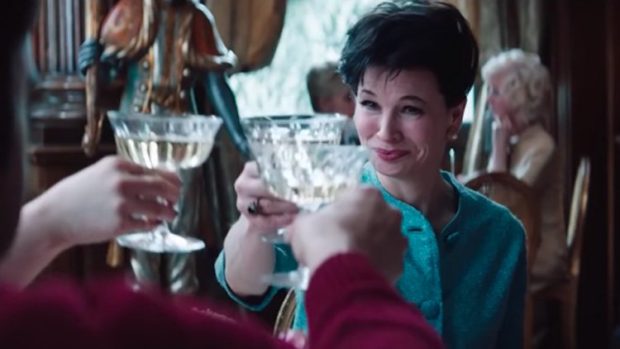
 Renée Zellweger gives a stunning performance as Judy Garland in the last year of her life, performing in London while suffering from the drug addiction that would eventually kill her.
Renée Zellweger gives a stunning performance as Judy Garland in the last year of her life, performing in London while suffering from the drug addiction that would eventually kill her.
The utter exhaustion of an addict who was also a world famous singer and movie star—that is the tragic story of Judy, a film from English director Rupert Goold about the last year in the life of Judy Garland. It’s adapted by Tom Edge from a play by Peter Quilter, both of whom are also English. Why this focus on an American star from English writers and filmmakers? Because by 1968, Judy Garland was so much in debt, to the tune of half a million dollars, and had so lost the faith of major American show business backers, that London was the only place she could get paid any significant amount of money to sing. So that’s where she went, and that’s where she died of an accidental overdose in 1969.
To succeed at dramatizing the life of such a great star is a difficult endeavor. Renée Zellweger has taken on the challenge, and it’s an astonishing piece of work. She’s mastered the look and the mannerisms of Garland’s later years, and to some degree even the voice. I say “to some degree” because I’m referring to her speaking voice, which is an amazing imitation. Zellweger also sings Garland’s songs in the film, and this, I think, was the right move as opposed to lip-synching Garland’s actual voice, because lip-synching somebody else’s voice always comes off wrong no matter how smoothly a film might try to pull it off. Well, Zellweger is a pretty good singer, but she’s not nearly as good as Judy Garland. Then again, who could be as good as Judy Garland? Nobody. So you can’t really demand perfection in that department.
We first meet the adult Judy doing a small club gig with two of her kids, Lorna and Joey, then returning to her hotel to find that her room has been taken away for repeated non-payment. She ends up having to drop her kids off at the home of their father, ex-husband Sid Luft, played by Rufus Sewell. We discover that Judy has lost her Los Angeles home, and is being sued by Sid for custody of their kids. Her one chance to make some money and reverse her downward slide is to take an offer from a London cabaret called Talk of the Town for a five-week singing engagement.
Interspersed with this main story are flashbacks to Garland’s youth as a star at MGM during the period in which she played the lead in The Wizard of Oz. The image of the bright and happy girl next door is a myth; the reality was horrifying. Studio chief L.B. Mayer thought she looked too fat. She was put on a diet of cottage cheese, coffee, and amphetamines. Her own mother was the first to demand she take these pills. The scenes in which Mayer talks down to Judy, explaining that she’s nothing without the studio, blackmailing her emotionally while making her work 18 hours a day, are chilling. These scenes act as an effective emphasis to the adult Judy drinking too much, using pills to get herself on stage and then to allow her to sleep, gradually killing herself from within.
The picture’s point of view on Judy Garland is a tragic one. It takes this stance rather than the usual bland adulatory approach to biography in films about stars. Most of the details are true. The part of the film where she befriends a gay couple who meet her after the show is fiction, put in there to emphasize the intense devotion of that part of her fan base, of which she was aware. Some of that sequence is actually pretty funny. There are other dramatic inventions, but if you study Garland’s life story, you might be surprised at how devastating the facts are. At the end when we learn that she was only 47 when she died, it’s a real shock.
The reality of someone that famous being a drug addict is that it’s more difficult to find someone who can help. People are either lying to her in order to be in her good favor, or they’re rejecting and mistreating her for her behavior, without knowing what to do. This is where Renée Zellweger’s performance really hits home. She reveals this incredibly talented person, desperate and afraid and seeking some kind of relief, as ultimately a woman who feels lost and alone in the world. Judy is a film about the real person behind the image, the person in agony, deep inside.

